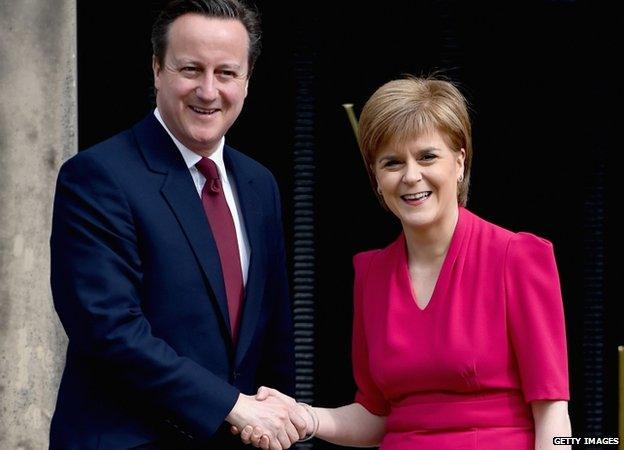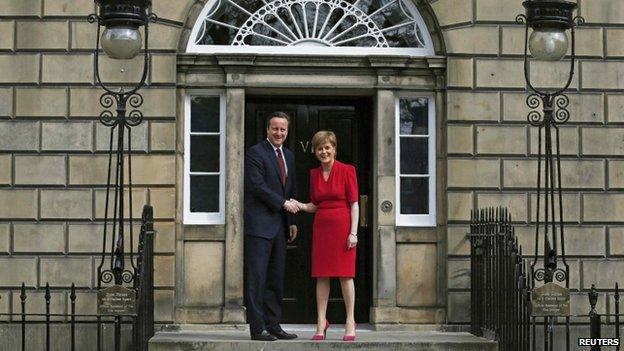Caution on both sides at first meeting of Cameron and Sturgeon
- Published

David Cameron has long since learned, like other prime ministers before him, to tread warily in dealing with the miasma of constitutional, electoral and strategic issues which comprise the body politic in Scotland.
So it was again today when he met Nicola Sturgeon in Bute House. And yet there is caution too on the first minister's side.
Why so? Competing mandates - and sundry thoughts as to how those mandates are most effectively exercised.
Both leaders took pains to describe today's talks as constructive. Yet both leaders retain distinctly different visions as to the final constitutional construct which could emerge.
Mr Cameron has, behind him, an overall Commons majority. He has the votes in the House. He could, if he chooses, wield that majority to legislate on Scotland as he chooses.
But he knows - and Nicola Sturgeon gently but firmly reminds him - that Scotland tends to prefer discussion to diktat. He is reluctant to resort to an early, overt rebuff in the light of the sweeping gains made by the SNP last week in the UK elections.
And so the prime minister offers to listen. He offers to consider ideas advanced by Ms Sturgeon as to further powers - beyond the Smith Commission agreement - which might usefully be devolved to Holyrood.
There is, to be clear, little evident enthusiasm in that offer. Mr Cameron makes clear that his preference, his primary concern, is to implement the Smith package in full, through legislation in the Commons.
Which is where the divisions lie. Ms Sturgeon wants to go considerably beyond Smith.

She wants devolved control of employment, the minimum wage, National Insurance, substantial welfare powers and equality policy - in addition to the control of income tax rates and bands plus a limited share of welfare featured in Smith.
And she wants discussion on these matters to proceed via debate within civic and political Scotland - as well as in the Commons. The two leaders, therefore, differ on substance and process too.
Apart, of course, from the small matter that, ultimately, Ms Sturgeon wants to end the Union which Mr Cameron strives to defend.
But Nicola Sturgeon is cautious too. She has disavowed gesture politics. She says the people of Scotland want and deserve mature representation by their elected tribunes.
Given that, she is unwilling to precipitate a crisis in the talks - at least too speedily. The issue here is exit strategy. She can cajole, she can persuade, she can demand. But, if the PM says no, what then? He has the votes in the Commons.
Again, down the line, Nicola Sturgeon could appeal once more for popular support in Scotland, citing claims that Westminster has neglected Scottish demands.
Equally, if not handled carefully, an early collapse of this renewed process might simply demonstrate that the SNP presence in the Commons - huge and vocal though it is - remains a UK minority, part of the opposition.
So Ms Sturgeon will seek to obtain what she can by consensus, by co-operation, by persuasion. Cautiously.